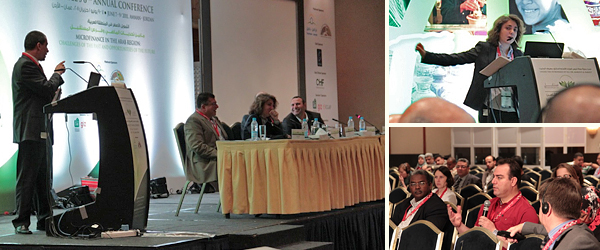Sanabel Annual Conference: Risk mitigation advice from people who've lived with crisis

The third and final plenary session of the Sanabel Conference, held on June 9, covered political risk management and contingency planning. The main presenter, Nadine Chehade from Planet Rating, the Global Microfinance Rating Agency, began by defining political risk and reminded the audience that the manifestations of political risk (like the recent revolutions in the Arab world) often come with a lot of hope for change, but also fear of the unknown. Chehade discussed how the stability of the regimes in most MENA countries was seen as a positive factor for political risk analysts, but now, after the “Arab Spring,” that is no longer the case.
Regardless of what rating agencies think of any country’s stability or lack thereof, the key for MFIs, according the Chehade, is how they react to unexpected shocks. In the second part of her presentation, she provided a broad list of risk mitigation strategies. These included:
- making sure that at least some of the institution’s leadership and board members are not politically affiliated,
- having business continuity and succession plans in place,
- training staff on safety procedures and generally having strong HR management practices,
- keeping client contact information close at hand,
- diversifying the client base and buying insurance, and
- imposing stricter controls for the cash kept in branches.
In the face of major crisis, Chehade also recommended resuming operations as quickly as possible, avoiding emotional decisions in the first 48 hours, and having clear rules for rescheduling and refinancing in place. She concluded her presentation by letting everyone know that in times of crisis, even raters understand that financial sustainability must take a backseat to MFIs’ social mission, but they do look at how an institution handles the recovery process.
Chehade’s presentation was followed by a panel of representatives from MFIs in Palestine, Iraq, and Lebanon. Many of the strategies implemented and lessons learned were similar across the panelists’ experience, including the importance of coordinating microfinance activities with relief efforts while maintaining a separate identity to avoid confusing the MFI’s mission in clients’ minds. Another interesting idea that emerged from the Q&A session was to have a regional level microfinance emergency fund administered by an organization like Sanabel.


